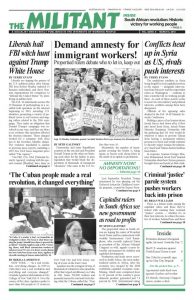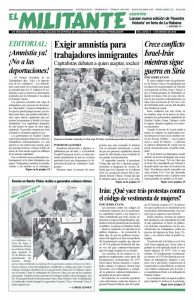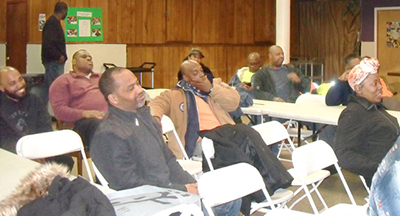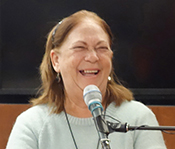NEW YORK — “In a real revolution, everything changes. In 1959 in Cuba there was a real revolution and everything and everyone changed,” Griselda Aguilera told students at City College of New York Feb. 8. Over the course of five days Aguilera spoke to more than 400 people at 12 events in New York City and New Jersey, one leg of a tour on the East Coast.
Aguilera was the youngest of tens of thousands of volunteers who joined the effort that wiped out illiteracy in Cuba in 1961. Some 700,000 workers and peasants learned to read and write during what the Cubans called the “Year of Education.” The campaign came just two years after workers and peasants had overthrown the U.S.-supported dictatorship of Fulgencio Batista. Fidel Castro and the revolutionary leadership knew “an ignorant and illiterate people couldn’t carry out the tasks the revolution needed,” Aguilera said.
The campaign effectively involved the whole country, she said. Schools were shut down that year so that “students could become teachers.” If you weren’t a brigadista or a student, she said, you were helping organize transportation, food, uniforms, lanterns and hammocks for them, or taking up arms to defend your country against those trying to overthrow the first socialist revolution in the Americas.
“We began to eliminate racism. Women broke the taboos and notions of what they could do and who they could be. We broke down the barriers between city and countryside,” she said. “Through this effort we became different people and a generation was forged that has sustained the Cuban Revolution through difficult days. It is not an accident that the revolution is still here.”
At most of Aguilera’s events the documentary “Maestra” (Teacher) by Catherine Murphy was shown. The film features interviews with veterans of the literacy campaign, including Aguilera. It shows Washington’s efforts to overthrow the revolution, including footage of the April 1961 invasion at the Bay of Pigs by U.S.-sponsored mercenaries, who were defeated by Cuban troops and volunteer militias in less than 72 hours. “Maestra” also describes ongoing attacks on literacy workers and students by counterrevolutionary bandits.
Talks with construction workers
A highlight of Aguilera’s visit here was her talk at the monthly meeting of 100 Black Construction Workers, organized by the Laborers’ International Union of North America. Most of those in attendance came straight from work. Aguilera had worked with workers in the construction industry in Cuba to expand their education and advance enforcement of health and safety.
“In Cuba, if a worker is hurt, an immediate investigation is done. The focus is what those running the project should have done to prevent the accident,” she said after workers described how bosses routinely blame on-the-job accidents on the worker in the U.S. To big applause she noted that all construction workers in Cuba are in the union.
“In Cuba the life of each person is fundamental,” Aguilera said the next day at a citywide meeting at the hall of the New York State Nurses Association. “The construction workers told me that here bosses want everything done fast, even if it means doing it unsafely and without proper training and equipment.”
Gail Walker, executive director of the Interreligious Foundation for Community Organization and one of the coordinators of the National Network on Cuba, which is organizing U.S. participation in the May Day Brigade to Cuba, chaired the meeting. She introduced Juanita Young and Hawa Bah, who explained how their sons had been killed by New York City police — Malcolm Ferguson in 2000 and Mohamed Bah in 2012. They described how they organized a growing group of mothers whose children had been killed by cops, and the fight they waged to hold the police accountable. Young and several of the other mothers visited Cuba in 2017.
At the massive May Day parade, “I noticed right away that we weren’t surrounded by cops,” she said. “What I saw on May Day and at the school we visited was a society based on solidarity, not competition. It showed me there is a different way of living.” She urged meeting participants to go see for themselves.
“It’s very emotional to hear these stories,” Aguilera said. “I knew these things happened in the United States, but it’s different to actually meet the mothers who have lived through it.”
At each meeting Aguilera explained that while the peasants and workers learned how to read and write, they taught the literacy volunteers too. “Responsibility, discipline, the importance of hard work, the maturity to confront life, the daily battle of field work. This was very different from the life of a young person in the city,” is how she put it at one of the two meetings for her at the Graduate School of Education at Rutgers University in New Brunswick, New Jersey. “The volunteers came home much more mature.”
In response to a question, Aguilera explained the ways the literacy campaign helped deepen the fight the revolution waged against racism. She said that Cuba was a very race-divided country before the July 26 Movement led the 1959 overthrow of Batista. “Sometimes a peasant who was white would say they didn’t want to be taught by a black teacher,” she said. “Instead of giving in, we would patiently explain how ideas like that were a remnant of the same society that had kept them from owning the land and oppressed them.”
But the campaign also began breaking down racism among the young teachers from the cities, she said. “Before, blacks had been friends with blacks, whites with whites. But the brigades were integrated. We all worked together as equals through all these experiences. The same was true of men and women, boys and girls. When we returned to school, the old divisions didn’t exist anymore.”
In Cuba, we have plenty of “problems of life,” Aguilera told a meeting of Puerto Rican independence activists at a program at El Maestro, a boxing club and community center in the South Bronx. “We don’t have enough housing, too many generations of a family are still forced to share a home.”
But everyone in Cuba has a place to live, she said, contrasting this to the homeless she had seen sleeping on the streets of New York, and the big, red “X”s marking empty and condemned housing she saw in Albany.
During the tour over a dozen people signed up to find out about the April 22-May 6 May Day Brigade to Cuba.
Aguilera also spoke at meetings of the People’s Organization for Progress and at Essex County College in Newark and to several classes of high school students in Plainfield, New Jersey; and at a Domestic Violence Shelter and at the office of Haiti Liberté newspaper in Brooklyn. She gave greetings to 60 students at an event organized by Students for Justice in Palestine being held in the room next to her City College meeting.
Nancy Boyasko contributed to this article.



